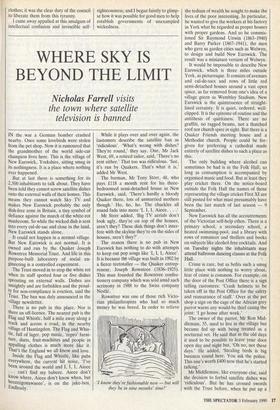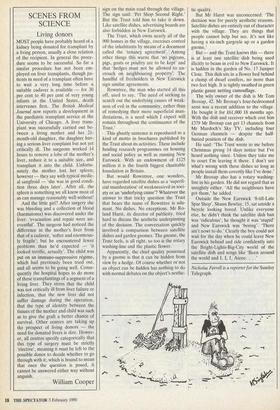WHERE SKY IS BEYOND THE LIMIT
Nicholas Farrell visits
the town where satellite television is banned
IN the war a German bomber crashed nearby. Once some lovebirds were stolen from the pet shop. Now it is rumoured that the grandmother of the world side-car champion lives here. This is the village of New Earswick, Yorkshire, sitting smug in its nothingness. It is a place where nothing ever happened.
But at last there is something for its 2,500 inhabitants to talk about. They have been told they cannot screw satellite dishes Onto the external walls of their homes. This means they cannot watch Sky TV and makes New Earswick probably the only dish-free zone in Britain, a tiny symbol of defiance against the march of the white-rot mushroom. So while the wicked dish is sent into every cul-de-sac and close in the land, New Earswick stands alone.
It could not happen in a normal village. Rut New Earswick is not normal. It is owned and run by the Quaker Joseph Rowntree Memorial Trust. And life in this Purpose-built laboratory of social en- gineering is a controlled experiment.
The Trust moved in to stop the white rot When its staff spotted four or five dishes sprouting on external walls. Dishes are unsightly and are forbidden and the penal- ty for non-compliance is eviction, said the Trust. The ban was duly announced in the Village newsletter.
There is no pub in this place. Nor is there an off-licence. The nearest pub is the Flag and Whistle, half a mile away along a track and across a road, in the nearby Village of Huntingdon. The Flag and Whis- tle, full of lager, pop music, 'repro' furni- ture, darts, fruit-machines and people in appalling clothes is much more like it. That's the England we all khow and love. Inside the Flag and Whistle, like pubs everywhere, the current hit noise, 'I've been around the world and I, I, I, Aieee
• . can't find my babeee. Aieee don't know where, Aieee don't know when, but heeeezgonawaeee', is on the juke-box. Endlessly.
While it plays over and over again, the ustomers describe the satellite ban as `ridiculous'. 'What's wrong with dishes? They're round,' they say. One, Mr Jack West, 69, a retired tailor, said, 'There's no rent either.' That too was ridiculous. `See, it's run by Quakers. That's what it is,' added Mr West.
The barman, Mr Tony Storr, 48, who pays £118 a month rent for his three- bedroomed semi-detached house in New Earswick, said, 'There's hardly a bloody Quaker there, lots of unmarried mothers though.' Ho, ho, ho. The chuckles all round fade into more `1, 1, I, Aieee. .
Mr Storr added, `Big TV aerials don't look ugly, they're on top of the houses, aren't they? These dish things don't inter- fere with the skyline they're on the sides of houses, aren't they?'
The reason there is no pub in New Earswick has nothing to do with attempts to keep out pop songs like 'I, 1, 1, Aieee'. It is because the village was built in 1902 by a fierce teetotaller — the Quaker entrep- reneur, Joseph Rowntree (1836-1925). This man founded the Rowntree confec- tionery company which was sold amid such acrimony in 1988 to the Swiss company Nestle.
Rowntree was one of those rich Victo- rian philanthropists who had so much money he was bored. In order to relieve they be in nine months' time?' '!know they're fashionable now — but will the tedium of wealth he sought to make the lives of the poor interesting. In particular, he wanted to give the workers at his factory in York what he regarded as proper houses with proper gardens. And so he commis- ioned Sir Raymond Unwin (1863-1940) and Barry Parker (1867-1941), the men who gave us garden cities such as Welwyn, to design and build New Earswick. The result was a miniature version of Welwyn.
It would be impossible to describe New Earswick, which is three miles outside York, as picturesque. It consists of avenues and cul-de-sacs and rows of little red semi-detached houses around a vast open space, as far removed from one's idea of a village green as Wembley Stadium. New Earswick is the quintessence of straight- lined certainty. It is quiet, ordered, well- clipped. It is the epitome of routine and the antithesis of quirkiness. There are no graffiti, no ragged beams, not a thatched roof nor church spire in sight. But there is a Quaker Friends meeting house and .a Methodist church. People could be for- given for preferring a cathedral made entirely of satellite dishes to such a place as this.
The only building where alcohol can sometimes be had is in the Folk Hall, so long as consumption is accompanied by organised music and food. But at least they play cricket there. On the notice-board outside the Folk Hall the names of those representing the village cricket First XI are still posted for what must presumably have been the last match of last season — 9 September.
New Earswick has all the accoutrements of the Victorian self-help ethos. There is a primary school, a secondary school, a heated swimming-pool, and a library with rows of romances and thrillers and books on subjects like alcohol-free cocktails. And on Tuesday nights the inhabitants may attend ballroom dancing classes at the Folk Hall.
Crime is rare, but as befits such a smug little place with nothing to worry about, fear of crime is common. For example, on the door of the Post Office there is a sign telling customers: 'Crash helmets to be taken off in the Post Office for the safety and reassurance of staff.' Over at the pet shop a sign on the cage of the African grey parrot warns any would-be thief casing the joint: 'I go home after work.'
The owner of the parrot, Mr Ron Mid- dlemass, 55, used to live in the village but became fed up with being treated as a nocturnal vet. He said that in the old days it used to be possible to leave your door open day and night but, 'Oh no, not these days.' He added, `Stealing birds is big business round here. You ask the police. This one's worth £400 now that he's started talking.'
Mr Middlemass, like everyone else, said the decision to forbid satellite dishes was 'ridiculous'. But he has crossed swords with the Trust before, when he put up a
sign on the main road through the village. The sign said: 'Pet Shop Second Right.' But the Trust told him to take it down. Like satellite dishes, advertising boards are also forbidden in New Earswick.
The Trust, which owns nearly all of the 900 homes in the village, exercises control of the inhabitants by means of a document called the 'tenancy agreement'.. Among other things this warns that 'no pigeons, pigs, goats or poultry are to be kept' and that 'hedges must not be allowed to en- croach on neighbouring property'. The handful of freeholders in New Earswick sign similar agreements.
Rowntree, the man who started all this off, used to say, 'The need of seeking to search out the underlying causes of weak- ness of evil in the community, rather than of remedying their more superficial man- ifestations, is a need which I expect will remain throughout the continuance of the Trust.'
This ghastly sentence is reproduced as a kind of motto in brochures published by the Trust about its activities. These include funding research programmes on housing and social policy as well as running New Earswick. With an endowment of £125 million it is the fourth biggest charitable foundation in Britain.
But would Rowntree, one wonders, have regarded satellite dishes as a 'superfi- cial manifestation' of weakness/evil in soci- ety or an 'underlying cause'? Whatever the answer to that tricky question the Trust that bears the name of Rowntree is ada- mant. No dishes. No exceptions. Mr Ro- land Hurst, its director of publicity, tried hard to discuss the aesthetic underpinning of the decision. The conversation quickly involved a comparison between satellite dishes and garden gnomes. The gnome, the Trust feels, is all right, so too is the rotary washing-line and the plastic flower.
Apparently, the chief quality possessed by a gnome is that it can be hidden from view by a hedge. Of course whether or not an object can be hidden has nothing to do with normal debates on the object's aesthe-
tic quality.
But Mr Hurst was unconcerned: 'The decision was for purely aesthetic reasons. Satellite dishes are entirely out of character with the village. They are things that people cannot help but see. It's not like having a six-inch gargoyle up or a garden gnome.'
But — and the Trust knows this — there is at least one satellite dish being used illicitly to beam in evil to New Earswick. It is hidden in the garden of No. 17 Juniper Close. This dish sits in a flower bed behind a clump of dwarf conifers, no more than two feet high. It is tightly swathed in green plastic gauze netting camouflage.
The wily owner of the dish is Mr Tom Broxup, 42. Mr Broxup's four-bedroomed semi was a recent addition to the village. He bought it for £61,000 18 months ago. With the dish and receiver which cost him £379 Mr Broxup can get 13 channels from Mr Murdoch's Sky TV, including four German channels — despite the half- buried position of the dish.
He said: 'The Trust wrote to me before Christmas giving 14 days notice• but I've heard nothing since. Unless they take me to court I'm leaving it there. I don't see what's wrong with these dishes so long as people install them covertly like I've done.'
Mr Broxup also has a rotary washing- line in his garden. He did not regard that as unsightly either. 'All the neighbours have got them,' he added.
Outside the New Earswick '8-till-Late Spar Shop', Shaun Bewlay, 15, sat astride a bicycle looking bored. Unlike everyone else, he didn't think the satellite dish ban was 'ridiculous', he thought it was 'stupid' and New Earswick was 'boring'. 'There ain't nowt to do.' Clearly the boy could not wait for the day when he could leave New Earswick behind and ride confidently into the Firight-Lights-Big-City world of the satellite dish and songs like 'Been around the world and I, I, I, Aieee. . .
Nicholas Farrell is a reporter for the Sunday Telegraph.



















































 Previous page
Previous page